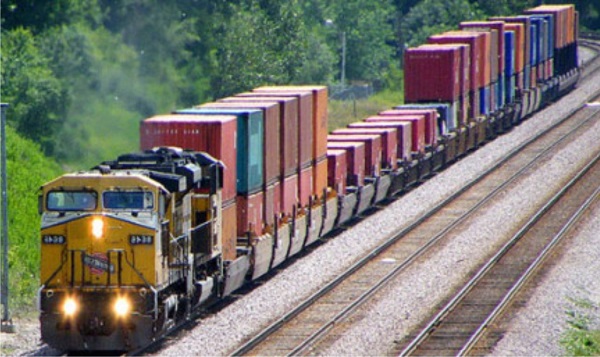PERISCOPE
Nigerian Railway Security Challenges And Prospects In Cargo Evacuation
By Ayoola Olaitan
In bid to rescue trapped cargoes and ensure seamless evacuation of containers, rail evacuation has been considered the best option to decongest terminals and allow export cargoes trapped at various private garages and port corridors access the ports through the road.
Railways are usually aimed at facilitating the transportation of cargoes in whatever shape: liquid, solid, light, heavy, bulky and even invisible, like gas.
It affords an opportunity to ferry goods and human beings in large numbers and at relatively low prices and this characteristic makes railway a major contributory factor to economic prosperity in any nation.
Since it is a fact that railways support economic growth, encourage domestic trade and facilitate the mingling of Nigerians of various backgrounds into a people sharing purpose and benefitting from each other, MMS Plus takes a look at the railway contribution to cargo evacuation from the ports, facilitation of exports and the numerous issues confronting the sector.
Given the importance of railways and its spread for national integration, it is thrilling that Nigeria has only recently resolved to modernise the railways, instead of having a holistic approach to expand it reach to all state capitals and other principal cities in the country, especially trade hubs.
NRC, through its contribution to the nation’s economy sets to link all sea ports to the main economic centres of the country and the main international airports, to make Nigeria the hub of an efficient intermodal transportation network for the West Africa subregion.
With the NRC modernisation initiative, the existing narrow gauge system across the country is gradually giving way to the wider standard gauge system that allows high-speed train operations on the railway network.
This has been boosted by an ambitious acquisition of new coaches and locomotives to service new and existing rail routes in different parts of the country, including the 186.5 kilometre Abuja-Kaduna rail corridor, and the 157 kilometre Lagos-Ibadan standard gauge rail lines.
Although as the Federal Government embarks on its ambitious rail development across the country, it has failed to address critical issues been faced in terms of security, connectivity and projects completion.
On Wednesday last week, operations at the Apapa container terminal, operated by APM Terminals, were held standstill as contractor handling the rail project at the Apapa port mobilised to site, blocked the truck exit gate and began demolition of structures in the terminal.
The action of the Chinese rail project contractor hampered Customs inspection, release and exit of containers at Nigeria’s busiest seaport.
Also, there was breakdown on the Abuja-Kaduna rail locomotives which occurred November 20, the train broke down due to failed locomotive along the route.
Railway access to other parts of the country has been challenging especially on the South East and South South routes with little or no development in terms of rail modernization.
Speaking with MMS Plus Newspaper, on the challenges encountered by the Corporation, the Lagos District Manager of NRC, Jerry Oche, posited that the ongoing construction work at the Lagos Port does not allow for evacuation of cargo using the railway. He also noted that the Covid-19 pandemic is another set back faced by NRC.
His words: “We are not doing freight evacuation because most of the freight come through the Lagos port but the ongoing construction does not allow for access to the port by rail”
Oche, however, reiterated that the rail system is the cheapest and safest mode of transportation for cargo evacuation in term of volume per time.
“A single train is 19 wagon and each of these wagon is about 40 tonns. If you are talking of a tank wagon for transporting products especially petroleum it is about 45,000 per litres.”
“If we do 20 tank wagons that means 45,000 litres multiplied by 20 tank wagons. This means we are talking about 25 to 35 trucks that can be seen in one train. Instead of taking about 30 truck drivers on the road to move such products, using the train you only talk to the district manager or operational manager which is an individual who can tell where exactly the train is at particular time.”
Oche queried the bad state of the Nigerian roads. He argued that if a truck leaves Lagos to Kano by road it will probably take a week if not more than to get to its destination unlike the rail which will take maximum of 72 hours to get to Kano.
Similarly, the Lagos District Manager also explained the security situation of moving cargoes through the rail from the port to its final destination.
Describing the security concerns on rail freight, he said; “there are no security issues on our cargo because we have armed men on our trains. Looking at an attempt on our mass transit train that was stoned earlier this year you shouldn’t compare that with the current situation of accessing Kaduna – Abuja road in terms of security”
“Our trains are in operation with armed men onboard. They are several security personnels and agencies so we have no security concerns. There is no need for us to change the security plans we have on ground.”
Meanwhile, Rotimi Raimi the Port Manager, Kaduna Inland Dry Port. In an interview with MMS Plus newspaper, noted the unique roles of railways and the threats to dry port operations in Nigeria.
He lampooned the nation’s use of obsolete local wagons and rail system, calling for modern electronic approaches.
His words: “There are several issues with the rail tracks and we utilize local wagons. Currently, they are doing some refurbishments on the rail lines. We should be able to load consignments via rail every 48 hours when the rail is functional. We should be able to move two or three rakes from the port when the rail system is perfect. Each rake can take up to 20 containers and we can do two or three every 48 hours.”
“This would also reduce the cost because going by road increases the cost of using the dry ports. An effective rail system would allow avail us the opportunity to send exports straight to the ports. That would enhance our traffic and it would give more confidence to importers and exporters.”
Raimi posited that the movement of cargoes from the Lagos seaports to Kaduna dry port in an ideal system shouldn’t take more than a day.
The low cost of freighting cargoes via rail when compared to other modes of transportation, should spur the government to speedily fix the rails so the ports can be decongested for imports and the rail optimizer to stimulate exports.
Speaking on the ongoing railway reconstruction, the Managing Director, NRC, Engr. Fidet Okhiria lamented delays encountered in the projects.
He opined that the delay in the rail construction along Apapa port corridors is due to the Oando pipeline along the Apapa port axis.
NRC has a herculean task to address the numerous challenges confronting the railway sector in the country whilst repositioning it to enhance cargo evacuation at the ports.






